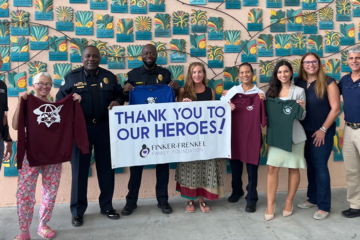The Future of Foundations and Endowments: Eugene Frenkel Discusses the Pandemic’s Impact on Charity in Virtual Roundtable

As the COVID-19 pandemic continues around the globe, charitable foundations, nonprofits, and educational endowments are working overtime to meet the increasing demands of a world in need. On a recent virtual panel moderated by Hattie Hill, President and CEO of the T.D. Jakes Foundation, Finker-Frenkel Family Foundation director Eugene Frenkel joined Patrick Fruzzetti, managing director and senior research analyst at the Rosenau Group at Hightower, and Meghan McAuley, President and Executive Director of the Invest in Others Charitable Foundation to discuss the ways in which charitable foundations have had to adapt to this rapidly changing environment.
Read on for highlights from Eugene’s conversation:
Hattie Hill: Thank you for being here everyone! We’re excited to talk about the future of education, endowments, nonprofits, and foundations in this post-COVID world and learn from each other – these are certainly interesting times! Eugene, we’ll start with you – the charity space is traditionally dominated by in-person events, that’s so much a part of our fundraising. As the pandemic hit, it made large galas and events unsafe. Do you think this is going to have an impact on the bottom line of some charitable organizations? How do you see people adapting so that we keep the funding going?
Eugene Frenkel: Look, I’d love to be optimistic here and say that, no, it’s not going to have an impact, but unfortunately, I’m seeing it already. I sit on the board of directors of Make-A-Wish, and every year, we have an annual gala. This gala is essential to the fundraising process. It allows us to grant wishes, it allows us to function as an organization. It’s 1,000 people in a room, tables that are less than six feet apart. We have these musical performances by top acts, we had Aerosmith last year and we had Lenny Kravitz the year before that. It was supposed to take place in November, but have now postponed it to February, hoping that things get better. I’m looking at the trends, I’m looking at the way things are unfolding, and it seems to me that we may need to rethink that.
I’ve seen a move toward Zoom fundraising nights that have been relatively successful, but I just don’t think it’s the same. I don’t think that people are able to connect in the way they can connect in person. When you see a Wish child tell a story standing 10 feet away from you, you’re emotionally connecting with everything they went through and what you’re doing to change their life. I’m not sure that can be accomplished the same way on a screen.
With that said, we have no other option today so we’re adapting. Another organization that we’re involved with called His House Children’s Home. It’s a place for foster children of all ages to live together in a supportive environment. What they’ve done is innovative: they’ve set up a camera, a 360-degree virtual tour that they’re able to put out to donors and prospects to help them understand what the organization is about and how their dollars are being put to work and interviews with the children, et cetera.
We’re being innovative, we’re thinking, we’re creating new ideas, but it’s short-term impact, absolutely long-term. Hopefully, we can come up with some ideas that’ll mitigate some of those damages.
Hattie Hill: It’s really created an interesting time for us to think about these things. Eugene, you’re a part of the University of Miami. We at the T.D. Jakes Foundation started this Virtual STEAM Academy and we were so proud of ourselves because, within three months, we had it online. Something that was normally held in the facility for about 500 students.
We took it online and we now have 3,000 students, but it created an interesting dynamic. We realized that some of the people were not getting their emails, that there was a connection issue that we needed to deal with. We had to go and get some Chromebooks to hand out. The virtual world created another set of issues that financially impacts your bottom line. With the work you’re doing with the University of Miami, how do you see COVID-19 impacting higher education in the long run?
Eugene Frenkel: It’s changed everything. The idea of going to school has always been that collaborative environment, where you’re sitting in a classroom and you’re learning from a professor. You have students left and right of you, and you’re going through those motions together. I think that that collaboration is equally as important as the information being delivered by the academic in front of you.
Now, I have 12 little boxes, and that’s the version of collaboration. You’re on a Zoom call and you have everybody’s face. Some people are turning their cameras on and off and muting themselves. It’s not the same. With that said, the University has been very proactive about making sure that all of the right systems and infrastructures are in place to be able to deliver the highest-quality education to students.
I think for us to determine the results and the effect of that is going to take a few semesters. Not only is it going to take a few semesters to understand how the students are progressing through a virtual classroom, but also, once they enter the work environment, it’s going to be interesting to see the type of professionals that are being put out from the University.
The University of Miami has done a great job because a lot of the classes were already going into some sort of a distance learning, and a lot of money was being invested into that kind of technology.
To learn more about how our charitable partners are adapting to the pandemic, please visit our blog: http://www.finkerfrenkel.org/blog/


